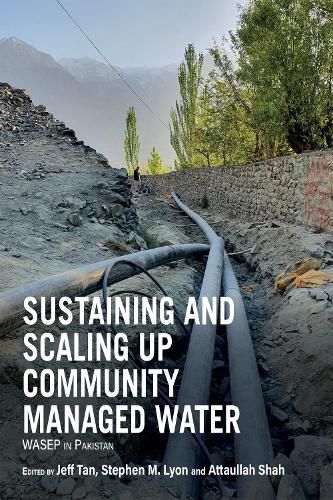Readings Newsletter
Become a Readings Member to make your shopping experience even easier.
Sign in or sign up for free!
You’re not far away from qualifying for FREE standard shipping within Australia
You’ve qualified for FREE standard shipping within Australia
The cart is loading…






Community-based water management (CBWM) remains the leading model for implementing and sustaining rural water supply services in low- and middle-income countries despite the lack of sustainability. Moreover, measures centred on providing external support to communities directly and through a wider policy and institutional framework have not improved sustainability. This book examines the key features, performance and limitations of the CBWM model through the case study of the Water and Sanitation Extension Programme (WASEP), a successful community-managed scheme that has delivered clean piped drinking water to over 450 mainly rural settlements in Gilgit-Baltistan, Northern Pakistan.
This case study draws on the findings of a 2019-2022 research project to assess the sustainability of WASEP and its scalability to urban centres funded by the British Academy's Urban Infrastructures of Well-Being Programme. The research was undertaken by an inter-disciplinary team of UK- and Pakistan-based researchers from the social, engineering, and environmental sciences, along with development practitioners. Both quantitative and qualitative data were obtained through a review of WASEP schemes, a large-scale household survey, interviews, focus group discussions, and an engineering audit, based on a random sample of WASEP schemes and control sites. The chapters examine different aspects of the CBWM model and WASEP and illustrate how community participation and engineering best practices can deliver and sustain clean drinking water up to a point, and the constraints of the CBWM model on long-term sustainability that is relevant to practitioners, communities, governments and donors.
$9.00 standard shipping within Australia
FREE standard shipping within Australia for orders over $100.00
Express & International shipping calculated at checkout
Community-based water management (CBWM) remains the leading model for implementing and sustaining rural water supply services in low- and middle-income countries despite the lack of sustainability. Moreover, measures centred on providing external support to communities directly and through a wider policy and institutional framework have not improved sustainability. This book examines the key features, performance and limitations of the CBWM model through the case study of the Water and Sanitation Extension Programme (WASEP), a successful community-managed scheme that has delivered clean piped drinking water to over 450 mainly rural settlements in Gilgit-Baltistan, Northern Pakistan.
This case study draws on the findings of a 2019-2022 research project to assess the sustainability of WASEP and its scalability to urban centres funded by the British Academy's Urban Infrastructures of Well-Being Programme. The research was undertaken by an inter-disciplinary team of UK- and Pakistan-based researchers from the social, engineering, and environmental sciences, along with development practitioners. Both quantitative and qualitative data were obtained through a review of WASEP schemes, a large-scale household survey, interviews, focus group discussions, and an engineering audit, based on a random sample of WASEP schemes and control sites. The chapters examine different aspects of the CBWM model and WASEP and illustrate how community participation and engineering best practices can deliver and sustain clean drinking water up to a point, and the constraints of the CBWM model on long-term sustainability that is relevant to practitioners, communities, governments and donors.